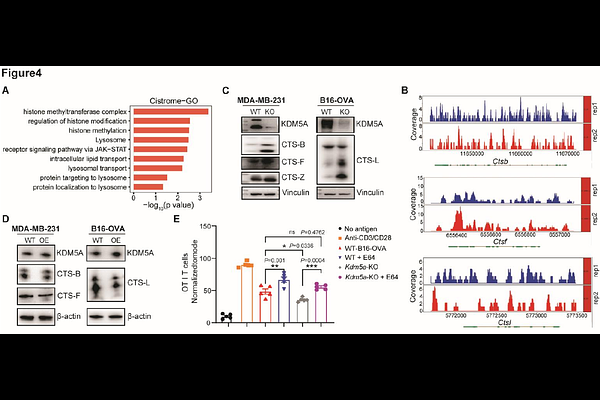KDM5A enhances MHC-I antigen presentation and potentiates antitumor immunity unleashed by immune checkpoint blockade

KDM5A enhances MHC-I antigen presentation and potentiates antitumor immunity unleashed by immune checkpoint blockade
Li, D.; He, C.; Tan, Z.; Wang, T.; Wu, H.; Zuo, P.; Dimitrov, D. S.; Wang, L.; Liao, X.
AbstractWhile some studies have implicated the histone 3 lysine 4 demethylase KDM5A in tumorigenesis and promotion of metastasis, KDM5A has also been shown to boost immunotherapy responses in melanoma. The distinct functional role of KDM5A in the context of immunotherapy and the underlying mechanisms remain largely unknown. Here, we report that higher KDM5A expression strongly correlates with higher MHC-I expression, CD8+ T cell infiltration, and prolonged survival in colorectal cancer and gastric cancer patients receiving anti-PD-1 therapy. KDM5A promotes MHC-I-mediated antigen presentation and CD8+ T cell-mediated tumor killing across multiple murine cancer models. Mechanistically, KDM5A upregulates MHC-I expression through the SOCS1/IFN-{gamma}/STAT1 signaling and improves tumor cell-intrinsic antigen presentation capacity by inhibiting lysosomal proteases in a demethylase-dependent manner. Moreover, KDM5A directly represses lysosomal cathepsins in dendritic cells and promotes the cross-priming activity. Through a high-throughput chemical compound library-based screen, we identified Clomiphene, an FDA-approved small molecule, which significantly elevates KDM5A expression, and enhances antitumor immunity during anti-PD-1 immunotherapy in mouse models of melanoma and colon cancer. Our findings that KDM5A functions in MHC-I-mediated immune activation during anti-PD-1 therapy present an opportunity for developing KDM5A-enhancing therapies to increase tumor immunogenicity, sensitize solid tumors to immunotherapy and exclude immune evasion.